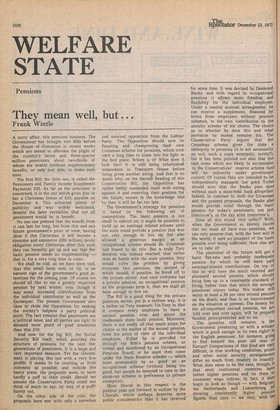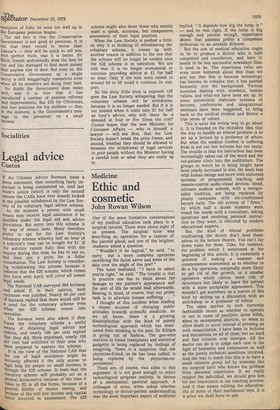Pensions
They mean well, but . . .
Frank Wintle
A sorry affair, this pensions business. The Government has brought two Bills before the House of Commons in recent weeks which are meant to alleviate the plight of the country's seven and three-quarter million pensioners, about two-thirds of whom are unable (without supplementary benefit), or only just able, to make ends meet.
The first Bill, the little one, is called the Pensioners and Family Income Supplement Payments Bill. As far as the pensioner is concerned, it is the one which gives him or her a Christmas bonus of £10, payable on December 4. This attracted plenty of publicity and was widely welcomed, despite the later revelation that not all pensioners would be in benefit.
No one can pretend that the benefit from it can last for long, but from this and any future government's point of view, having done it this Christmas, it will become a tiresome and expensive (£80 million) moral obligation every Christmas after this until they can honestly get up and say that the basic pension needs no supplementing — that is, for a very long time to come.
We shall be told, as we have been told, that this small lump sum, or tip, is an earnest sign of the government's good in tentions for the coming year. Of course we should all like to see a greatly improved pension by next winter, even though it may mean increased contributions from the individual contributor as well as the Exchequer. The present Government also likes to chide the Opposition for making the society's helpless a party political point. The fact remains that pensioners are a political issue, and all parties are right to demand more proof of good intentions than this £10.
And now for the big Bill, the Social Security Bill itself, which provides the structure of pensions for the next few generations of pensioners. It is a large and very important measure. Yet the Govern ment is playing this one with a very low profile; it seems to be courting as little comment as possible, and outside the heavy press, the proposals seem to have hardly a puff to their credit. Should we assume the Conservative Party could not think of much to say, by way of a puff? Surely not.
On the other side of the coin, the proposals have met with only a nerveless and nominal opposition from the Labour Party. The Opposition should now be flaunting and championing their own Crossman scheme for pensions, which took such a long time to come into the light in the first place. Where is it? What does it look like? It is still being refurbished somewhere in Transport House before being given another airing. And that is no doubt why, on the Seconil Reading of this Conservative Bill, the Opposition has rather feebly contended itself with voting against it and reserving their position for the future, secure in the knowledge that by then it will be far too late.
The Government's strategy for pensions is based on the following set of assumptions. The basic pension is too small to subsist on; it might be possible to build up an earnings related scheme until the state could provide a pension that was not only enough to live on, but also allowed a generous margin as an occupational scheme should do. Crossman had hoped to do this. But a truly Tory decision was instead reached: that rather than do battle with the state pension, they would solve the problem by giving everyone two pensions, the second of which should, if possible, be hived off to the private sector. And once everyone has a private pension, an occupational pension as the proposals term it, then we shall all have enough to live on.
The Bill is a good thing for the private pensions sector, yet in a curious way, it is a rather un-Tory measure. Un-Tory in that it compels every employee to have a second pension over and above the inadequate state basic pension. Moreover, there is not really all that much scope for choice in the matter of the second pension, from the point of view of the individual employee. Either he is provided for through his firm's pension scheme, as vetted and monitored by an Occupational Pensions -Board, or he must then come under the State Reserve scheme — which must presumably be as good as an occupational scheme' (without being too good, lest people be tempted to turn to the state-run scheme in preference to private enterprise).
More liberal in this respect is the pension plan put forward in outline by the Liberals, which perhaps deserves more public consideration than it has received
for some time. It was devised by Desmond Banks, and with regard to occupational pensions it allows more freedom and flexibility for the individual employee. Under a central account arrangement, he can receive a supplement, financed bY levies from employers without pension schemes, to his own contribution to the annuity scheme of his choice. The choice as to whether he does this and what provision he makes remains his. The Conservative Party argues that the Crossrhan scheme gives the state a monopoly in pensions (it is not necessarily an evil, such a state monopoly, surely?), but it has been pointed out also that the vast sums which are likely to accumulate in the Conservatives' reserve scheme fund will be indirectly under government control. Of course they are intended to be independently managed; but good Tories should note that the Banks plan does without such a state-held fund altogether, Indeed, in contrast to both the Crossman and the present proposals, the Banks pia' would provide relief through the basic pension for today's pensioners, not just, tomorrow's, or the day after tomorrow's.
Does all this sound very unfair? Well, when the Government so sternly insists that we must all have 'two pensions, we can only assume that, with the best will in the world, it sees no prospect of the basic pension ever being sufficient. How else are we to take it?
The pensioner of the future will get a basic flat-rate and probably inadequate pension for which he will have paid earnings-related contributions. On top of this he will have the much vaunted and aforesaid second pension which should bring him up to a reasonable standard of living, better than that which the average pensioner enjoys today. His widow will enjoy at least a 50 per cent second pension on his death, and that is an improvement on the situation at present. The money for the all-important second pension, we are told over and over again, will be properlY funded, price-protected and so on. The question still remains, is the Government presenting us with a scheme which is good enough in its own right? Is the English pensioner, for instance, going to find himself the poor old man of Europe? Comparisons of this kind are verY difficult, in that working conditions, price5 and other social security arrangement5 differ so much from country to country' What does seem to be the case, though, ls that most continental countries have rather higher pensions and tie them to consumer wage indices. In fact, it does begin to look as though — with Belgiunl, the Netherlands and Luxembourg all showing consistently higher pension figures than ours — we may, with the
exception of Italy, be none too well up in the European pension league.
The sad fact is that the Conservative Government is not good at pensions. It is not that their record is worse than Labour's — they will be quick to tell you, With perfect truth, that it is better. Sir Keith Joseph undoubtedly does the best he can and has managed to find more money than anyone else to date. But even so, the Conservative Government as a single entity is still staggeringly insensitive even When all its members are doing their best.
No doubt the Government does mean Well, and it is true that it has introduced a number of pension reforms and improvements. But £10 for Christmas, and two pensions for his children — that, at the moment, is the Government's message to the pensioner on a small Income.











































 Previous page
Previous page